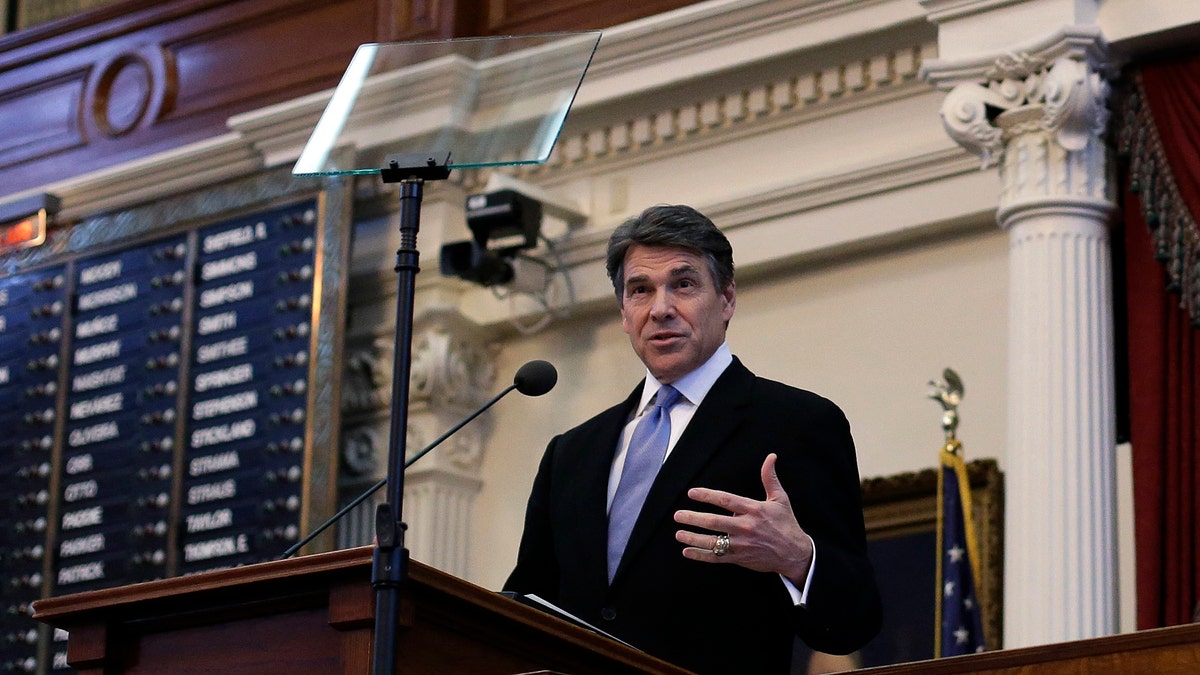
Texas Gov. Rick Perry addresses the opening session of the 83rd Texas Legislature, Tuesday, Jan. 8, 2013, in Austin, Texas. Texas legislators opened their 140-day session Tuesday poised to debate how to pay for public schools, decide whether to drug test unemployment recipients and possibly confront a mounting water crisis under the strain of a rapidly growing population. (AP Photo/Eric Gay)
Some in Texas are taking note that Governor Rick Perry and state Republicans are seemingly taking the emphasis off border enforcement and undocumented immigrants.
One clue, as Fronteras Desk pointed out on its website Thursday, is that in the Texas State Legislature that convened Tuesday, Gov. Perry’s opening remarks were devoid of any mention of “sanctuary cities” or an SB 1070 bill much like the one that was passed in Arizona, .
The online publication notes that this wasn’t the case in 2011 when in his opening remarks to the 82nd Texas Legislature Perry included his stance to abolish “sanctuary cities” among the “emergency items” he listed.
“Perry leaving immigration out this time… is [the GOP] trying not to be as in your face about the topic,” said Prof. Calvin Jillson, a political science professor at Southern Methodist University in Dallas. “I think rhetorically they’re going in a new direction.”
Perry, who campaigned for the presidency last year before dropping out after a quick rise and fall in the polls, was criticized by Republican voters for being too soft on immigration. He was even booed by a debate crowd after he defended his stance on legislation giving financial aid to undocumented students.
“If you've been in Texas for three years, if you're working towards your college degree, and if you are working and pursuing citizenship, you pay in-state tuition there. And the bottom line is it doesn't make any difference what the sound of your last name is. That is the American way,” Perry said back in September at a debate hosted by the Tea Party Express and CNN.
“I know that Governor Perry understands that the immigration issue is much more complex than 'legal versus illegal immigration' and that the border is much bigger the further one lives from it,” said Francisco Hernandez, an immigrant rights attorney based out of Ft. Worth, TX. “He frequents Mexico and takes Spanish lessons. He has a good heart on this issue.”
While it can be argued that Perry has been more progressive when it comes to some undocumented immigrant issues, the Texas Republican Party hasn’t quite been on the same page.
“The Tea Party element of the base is not yet focused on increasing the Latino vote for the party,” said Jillson.
Steve Munisteri, Chairman of the Republican Party of Texas, begs to differ. He thinks his party already has the Latino vote and support.
"Everybody else is talking out of their rear end," say Munisteri. "We’re getting a significant portion of Hispanics to support us now."
Munisteri cited extensive internal polling by the the state party that shows that they've had and have the Latino vote in recent elections. He specifically cited that the polling showed that only 18 percent of Texas Hispanics identify themselves as liberal.
"In the state of Texas we’ve elected more Hispanics statewide. That’s a fact," he said.
Munisteri disagrees with the notions that the party is backing off in order to gain support.
But Jillson believes that some elements in the GOP have softened on the topic because Latinos in the state, born here or not, perceive any anti-immigration stance as anti-Latino. However, he believes that the Tea Party base and the number of Republicans in power in the state leaves them years behind the national Party, who have already began an outreach to Latinos.
“Republicans in Texas have been so successful [in getting elected] the past 15 years. I’d say it’ll be around the 2020s before [Democrats actually challenge them] into changing.”
The Tea Party element of the base is not yet focused on increasing the Latino vote for the party.
In 2011, after the U.S. Supreme Court ruled in favor of the controversial “papers” provision in the Arizona’s SB 1070 bill, Texas Republicans tried to pass a similar bill but were denied.
This past June at the Texas Republican convention in Ft. Worth, the party voted to adjust their aggressive stance on undocumented immigrants by adding a guest worker program they call the “Texas Solution.”
Even with an estimated 10 years before their power is challenged, Jillson believes the party needs to react sooner rather than later if it wants to gather Latino support.
“People listen and remember,” said Jillson. “So Republicans will not have access to Republican votes if they decide not to reach out or soften their stance with Latinos.”
Follow Victor Garcia on Twitter @MrVicGarcia
Follow us on twitter.com/foxnewslatino
Like us at facebook.com/foxnewslatino




